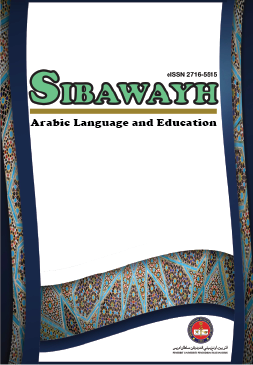الإعجازُ البلاغي في قَضِيَّةِ الحَذْفِ في سورة الكهف
Rhetorical miracle in the case of deletion in Surat al-Kahf
DOI:
https://doi.org/10.37134/sibawayh.vol1.2.10.2020Keywords:
Al- Hazf that is against Al-zikr, rhetorical miracles, Surah al-Kahf, Quranic systemsAbstract
This study is concerned with some knowledge of the secrets of Quranic rhetoric. We subjected ourselves to the study of rhetoric and the knowledge of its secrets, its artists, and its flavor, especially what lies in the Holy Quran. And the studies of the scholars and the researchers' studies did not and will not stop the research, learning and education of the Holy Quran, and it has not been proven until now that anyone has studied the rhetoric and rhetoric grammar through the Qur’an’s systems and methods. The students ’questions - why, how, and what is the reasoning - about the rhetorical and grammatical causes and issues still invite the scholars to research, study, and discover, especially what is contained in the Holy Qur’an. Among these issues is the issue of “Al- Hazf wa Al-Zikr”. It is a difficult issue of “Ilm Al_ma`ani”. In the past, scholars were subjected to the omitted estimation to return the phrase to an ideal level. This was at the hands of linguists, grammarians and others. The intention behind this was to reach the significance that appears under the word, whether deleted or mentioned, especially with regard to the relationship of deletion by mentioning. The question always arises, what is the reason for this deletion? And if the word was mentioned, is the technical picture moving away from the deletion?
The issue of “Al-Hazf wa Al-Zikr” is one of the issues that examine the properties of speech structures and knowledge of the varied denominators. In the researchers ’struggle within the beauty of language and methods found in the Qur’an, this study emerged from which the student tries to show the aesthetics of the artistic image and the rhetorical jokes that the issue of “Al-Hazf wa Al-Zikr” draws. One of the most important topics that the learner will focus on, which is the aim of this study, is to identify the significance of the deletion and what it seeks to achieve, then the benefit from every deletion site that it passes through, through an analysis of the evidence it derives from the verses of Surat Al-Kahf rhetorically. In light of this, the learner took the methodology of the study induction and analysis, and applied to the verses of Surat Al-Kahf, to reveal the aesthetics of “Al-Hazf wa Al-Zikr”, and their rhetorical flavor, clarifying the rhetorical meanings that arise from the context of the method. The learner also discussed understanding deletions and mentioning by rhetoric, through their definitions, and knowing the terms and conditions for estimating deletions.
Downloads
References
Ibn Mansoor, Tongue of the Arabs, C16, Article (H.F.), Dar Sader, 1990, Beirut, D.T. Anis, Ibrahim et al., The Intermediate Dictionary, Cairo: i2 1972.
Al-Tahanoi, Muhammad Ali Al-Hanafi, Art Scouts, Beirut, I1, Scientific Books House, 1998.
Al-Jarjani, Abdul Qahir, 1960, Evidence of Miracles, Investigation of Mr. Mohammed Rashid Reda (Library and Printing Press of Muhammad Ali Sobeih & Sons, i6).
Al-Jarjani, Abdel Qahir, 1979, Secrets of Eloquence, Explanation and Commentary by Dr. Mohamed Abdel Moneim Khafaji (Cairo Library, i3, c2).
Hussein, Nasreddine Ibrahim Ahmed, i 2002, the faces of miracles in the stylistic and cognitive discourse of the Qur'an, (Kuala Lumpur: published by the International Islamic University Press in Malaysia).
Hafni, Mohammed Sharaf, the exquisite images between theory and practice, C2.
Al-Damascene, son of Kabir Al-Qurashi, interpretation of the Great Qur'an (Riyadh: Dar es Salaam Library, i1, Volume 3).
Al-Razi, Mohammed bin Abi Bakr, Mukhtar La Sahah, Library of Lebanon, 1986.
Al-Zamakhshari, Abu al-Qasim Jarallah Mahmoud, scout on the facts of impartiality and the eyes of the sayings in the faces of the ta'wil, C2, (Beirut: Dar al-Knowledge).
Amer, Fathi Ahmed, i, 1975, the idea of systems between the faces of miracles in the Holy Quran, (Cairo: Edition of the Supreme Council for Islamic Affairs, D.I.).
Amer, Fathi Ahmed, second meanings in the Qur'anic style (Egypt: Knowledge Facility).
Amer, Fathi Ahmed, The Eloquence of the Qur'an between Art and History, (Egypt: Knowledge Facility).
Akkawi, Anam Foal, The Detailed Dictionary in The Sciences of Rhetoric, Review by Ahmed Shamseddine' Beirut, Scientific Books House, i2 1992.
Al-Fayrouz Abadi, Majduddin Mohammed bin Yaacoub, Surrounding Dictionary, Investigation of the Heritage Investigation Office of the Al-Resala Foundation, supervised by Mohamed Naeem Al-Araksussi, Al-Resala Foundation, Lebanon, i8, 2005.
In 2004, The Science of Meanings (Cairo: The Chosen One for Publishing and Distribution, i2).





